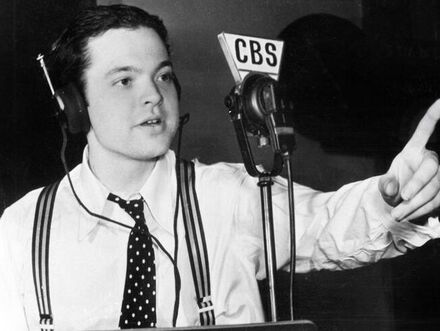HALLOWEEN HYSTERIA OR HOAX?
It wasn’t sponsored. It wasn’t rated. And it was broadcast opposite Network Radio’s most popular program, Sunday night's Chase & Sanborn Hour with Edgar Bergen & Charlie McCarthy and ratings in the 30's on NBC.
Nevertheless, Orson Welles’ Mercury Theater performance of Howard Koch's adaptation and John Houseman's production of H.G. Wells' War of The Worlds on CBS October 30th, 1938, made history. The realistic broadcast of a Martian invasion was blamed for a widely reported panic of huge proportions and became the target of scorn by editorial writers and politicians for weeks afterward. (1)
Subsequent investigations into the "panic" have found it to be based in isolated and unsubstantiated events multiplied many times over by a press eager to discredit radio as a news source. There was no running into the streets by fearful listeners, no epidemic of heart attacks and no suicides to escape a fate worse than death.
My comments about the broadcast and its aftermath, abridged from the 1938-39 chapter of Network Radio Ratings, 1932-1953, are also posted. And here are several pertinent timing facts about the broadcast that reportedly “panicked millions” of listeners.
The “actuality” portion of the broadcast - fictionalized “on the scene” reports of a Martian invasion of New Jersey and New York - began approximately eleven minutes into the broadcast and continued for a little over 29 minutes. In detail:
00:00 Program theme and announcer introduction.
00:37 Orson Welles’ prologue and disclaimer.
02:20 Mock weather forecast and introduction of dance band remote.
03:38 Bulletin of gas explosions, (later presumed to be rocket launchings), on Mars.
04:20 Dance music resumes.
05:12 Announcement of coming interview with a Princeton astronomer about Mars.
05:44 Dance band music continues.
06:05 Newsman “Carl Phillips” interviews Princeton's "Professor Pearson," (Welles).
08:37 Newsman reads bulletin of “seismic” explosion within 20 miles of Princeton
09:30 Piano interlude
09:40 Bulletins of more explosions and first report of Martian landing in New Jersey
10:40 Dance music resumes
11:04 The "Martian invasion" described by Mercury Theater actors portraying reporters, government officials and armed forces personnel.
40:25 Disclaimer and the CBS system cue for local station breaks
41:05 Welles’ “post-invasion” monologue and dialogue with a “survivor” of the attack
57:35 Welles’ closing comments repeating the disclaimer
58:35 Program theme and announcer closing.
Could only 29 minutes of radio drama - plus the seven minutes leading up to it - create such a mass panic in so short a time? Or was that reaction grossly over-blown? And was something else behind the press-led public outrage? Listen to the audio posts below and see what you think. It's only natural if you notice some similarity in the voices because Kenny Delmar played four different roles in the drama, Ray Collins and Richard Wilson played three roles and Paul Stewart, Bill Herz, Carl Frank and Welles each played two.
What did Orson Welles himself think of the broadcast? His closing remarks on the program best sum up his attitude:
This is Orson Welles, ladies and gentlemen, out of character to assure you that The War of The Worlds has no further significance than as the holiday offering it was intended to be - The Mercury Theater’s own version of dressing up in a sheet and jumping out of a bush and saying, “Boo!”
Starting now we couldn’t soap all your windows and steal all your garden gates by tomorrow night so we did the next best thing - we annihilated the world before your very ears and utterly destroyed CBS. You will be, I hope, relieved to learn that we didn’t mean it and both institutions are still open for business.
So goodbye, everybody, and remember the terrible lesson that you learned tonight - the grinning, glowing, globular invader of your living room is an inhabitant of the pumpkin patch and if your doorbell rings and nobody’s there, that was no Martian, it’s Halloween.
The War of The Worlds was excellent radio drama based in classic fiction. Its aftermath was sensationalized journalism based in ulterior motives that backfired when the notoriety landed a sponsor for Orson Welles' Mercury Theater.
(1) Both The Chase & Sanborn Hour and Mercury Theater of The Air were aired once at 8:00 p.m. Eastern Time, 7:00 p.m. Central, 6:00 p.m. Mountain and 5:00 p.m. Pacific Time, with no repeat broadcasts.
Copyright © 2014 Jim Ramsburg, Estero FL Email: [email protected]
| welles.wma | |
| File Size: | 6860 kb |
| File Type: | wma |
| mercury_theater__10-30-38.mp3 | |
| File Size: | 28474 kb |
| File Type: | mp3 |


